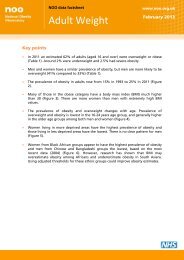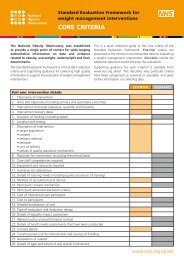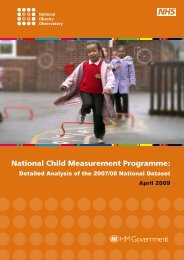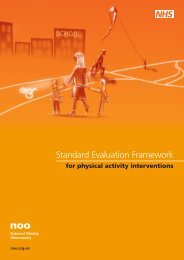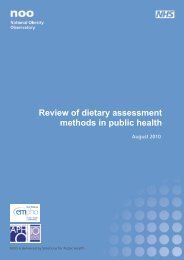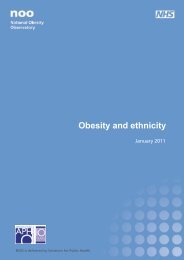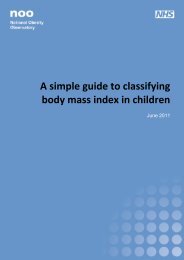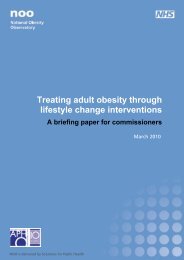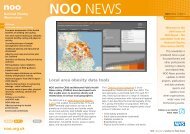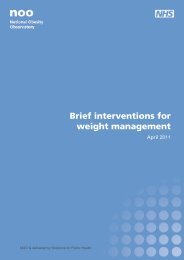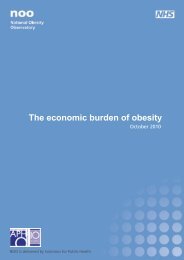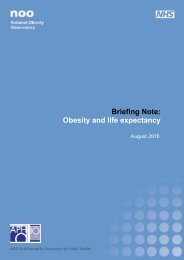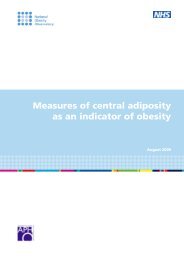Knowledge and attitudes towards healthy eating and physical activity:
Knowledge and attitudes towards healthy eating and physical activity:
Knowledge and attitudes towards healthy eating and physical activity:
You also want an ePaper? Increase the reach of your titles
YUMPU automatically turns print PDFs into web optimized ePapers that Google loves.
The National Diet <strong>and</strong> Nutrition Survey 2000/01 (NDNS 2000/01) also asked questions<br />
about <strong>attitudes</strong> <strong>towards</strong> weight <strong>and</strong> weight loss, <strong>eating</strong> patterns <strong>and</strong> emotional<br />
triggers for <strong>eating</strong>. Respondents were asked which scenarios applied to them <strong>and</strong><br />
were given the options; ‘never’, ‘seldom’, ‘sometimes’, ‘often’ or ‘very often’. These<br />
data were analysed to identify significant differences in responses between the whole<br />
sample <strong>and</strong> the different BMI categories (‘underweight’, ‘<strong>healthy</strong> weight’,<br />
‘overweight’, ‘obese’ <strong>and</strong> ‘morbidly obese’), <strong>and</strong> significant differences between those<br />
of a <strong>healthy</strong> weight <strong>and</strong> the other BMI categories.<br />
Individuals who were obese or morbidly obese were significantly more likely than the<br />
whole sample, or those of a <strong>healthy</strong> weight, to say that they ‘try to eat less at meal<br />
times than (they) would like’ either ‘often’ or ‘very often’.<br />
Individuals who were categorised as overweight or obese (but not morbidly obese)<br />
were significantly more likely than the whole sample <strong>and</strong> those of a <strong>healthy</strong> weight to<br />
say they ‘deliberately eat foods that are slimming’, ‘try not to eat between meals<br />
because [they] are watching [their] weight’ or ‘try not to eat in the evening’ either<br />
‘often’ or ‘very often’.<br />
Overweight individuals (but not obese or morbidly obese individuals) were<br />
significantly more likely than the whole sample or those of a <strong>healthy</strong> weight to report<br />
that they ‘take [their] weight into account with what (they) eat’ either ‘often’ or ‘very<br />
often’. Individuals who were underweight or a <strong>healthy</strong> weight were significantly less<br />
likely than the whole sample to report that they ‘try not to eat between meals<br />
because [they] are watching [their] weight’ either ‘often’ or ‘very often’.<br />
ii Factors influencing <strong>eating</strong> habits<br />
Obese respondents from the NDNS 2000/01 were significantly less likely than <strong>healthy</strong><br />
weight respondents to say that they ‘could resist <strong>eating</strong> delicious food’ either ‘often’<br />
or ‘very often’. This group was also significantly more likely than the whole sample, or<br />
those of a <strong>healthy</strong> weight, to say that they have a desire to eat when:<br />
• they are irritated<br />
• they are depressed or discouraged<br />
• someone has let them down<br />
• they are worried, anxious or tense<br />
• things are going against them or have gone wrong<br />
• they are emotionally upset<br />
• they are bored<br />
• they are disappointed<br />
• they are lonely<br />
• they have nothing to do<br />
These data suggest that, compared with people of a <strong>healthy</strong> weight, the <strong>eating</strong> habits<br />
of obese <strong>and</strong> morbidly obese individuals are more influenced by emotional triggers.<br />
There were no significant differences in responses from individuals of a <strong>healthy</strong><br />
weight <strong>and</strong> other BMI categories for the questions:<br />
• If food smells <strong>and</strong> looks good, do you eat more than usual<br />
NOO | <strong>Knowledge</strong> <strong>and</strong> <strong>attitudes</strong> <strong>towards</strong> <strong>healthy</strong> <strong>eating</strong> <strong>and</strong> <strong>physical</strong> <strong>activity</strong>: what the data tell us 15



